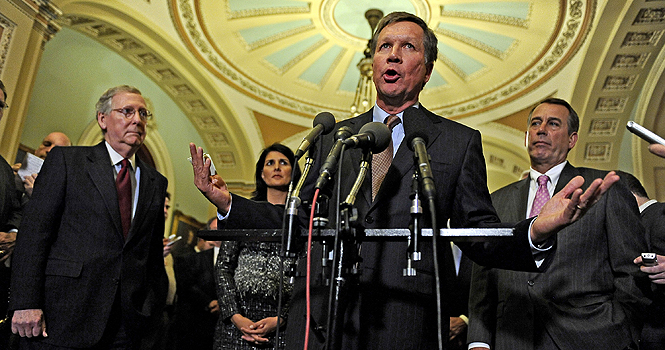Campaign funds to help pay Ohio Governor’s speech costs
Ohio Governor-elect John Kasich talks to reporters after meeting with House Speaker-designate John Boehner (R-Ohio), right, Senate Minority Leader Mitch McConnell (R-Ky.), left, and other GOP Governors-elect at the United States Capitol in Washington, D.C., Wednesday, December 1, 2010. Photo courtesy of (Mary F. Calvert/MCT).
COLUMBUS, Ohio (AP) — Barred from using Ohio tax dollars, some state lawmakers are expected to use campaign cash to cover their travel expenses for the governor’s relocated State of the State address this year.
State law allows elected officials to pay for gas and meals related to their duties with political donations. The provision keeps taxpayers from picking up certain tabs, but it’s raised concerns from at least one state government watchdog group that says it has the potential to extend donors’ influence beyond elections.
Gov. John Kasich is delivering his annual policy speech Tuesday afternoon from Wells Academy elementary school in Steubenville, an Eastern Ohio city close to the West Virginia border. It will mark the first time the speech is delivered outside the Statehouse in Columbus. The first-term Republican has defended the move as providing a boost to a neglected area.
State, city and school officials say they aren’t anticipating any additional costs related to the speech. But a final spending figure isn’t yet known.
No extra state dollars will be spent on getting all 132 state legislators to Steubenville, even though their joint session with Kasich is being held 130 miles east of Columbus.
Most lawmakers typically receive a weekly mileage allowance that covers one round-trip to the Statehouse from their homes.
Carpooling to the event has been strongly encouraged, according to a memo the Kasich administration sent to its 26 Cabinet officers.
Several Republican senators and staff are making trip from Columbus in an $840 rented bus paid for by their caucus’s campaign fund. The drive is expected to take three hours, one way, from the capital. Travel time could, however, be longer or shorter for some officials leaving from their homes.
State lawmakers won’t get any money for hotel stays or food along the way.
“It is their responsibility to take care of that,” said Mike Dittoe, a spokesman for the Ohio House. “There [are] no taxpayer dollars associated with the reimbursement of that at all.”
House Speaker William Batchelder has said staff will not be paid for travel to the event either.
Of more than 200 House staffers, less than a dozen are expected to go to the speech, Dittoe said.
Using campaign contributions to pay for doing the normal work of government could put increasing pressure on lawmakers to raise money just to function, says Catherine Turcer, director of the Money in Politics project that researches contributions to Ohio’s statewide and legislative candidates.
“The notion that if you use campaign money that it doesn’t cost the taxpayer money is silly because it opens the doors to campaign contributors,” Turcer said. “It increases their access and their role in government.”
Neither Common Cause Ohio nor the League of Women Voters of Ohio has taken a position.
Taxpayers will pay speech-related costs for some state employees and administration officials, though those amounts aren’t yet known.
State Auditor David Yost plans to attend the speech and use state money to pay for the trip, his spokeswoman said. Yost and one staff member are taking a state car, and he also plans to attend a separate event in the area.
Attorney General Mike DeWine, Secretary of State Jon Husted and Treasurer Josh Mandel do not plan to attend. The seven justices on the GOP-controlled Ohio Supreme Court also won’t be there because court is in session.
Kasich spokesman Rob Nichols called concern about the costs to taxpayers “much ado about nothing.”
Nichols said state agencies and the governor’s office already have travel budgets to cover mileage and other expenses.
“They are utilizing the travel budget because this is legitimate travel,” Nichols said. “Almost all are participating in other events up there — so it’s not just going up to the speech and coming back.”
Nichols said he couldn’t provide the number of administration officials who are going and how many cars they are taking because arrangements were still being made. Most are traveling on Tuesday. Meals aren’t covered, and only a few people in the governor’s office were expected to get reimbursed for overnight lodging.
It is unclear how much more security will cost this year compared with past State of the States.
The Ohio State Highway Patrol doesn’t break down spending on individual events, said Lt. Anne Ralston, a spokeswoman for the agency. She declined to say how many troopers would be working at the event, citing security reasons.
The city of Steubenville isn’t incurring any additional expenses in handling the increased traffic and visitors, said Cathy Davison, the city manager.
The school doesn’t expect to be billed for any overtime or other charges. “It’s all cost-free so far for us,” said Mike McVey, superintendent of Steubenville City School District.
Costs related to televising the speech will be more than in prior years, but “not unreasonable,” said Dan Shellenbarger, executive director of Ohio Government Television, a state-funded public broadcasting operation.
He didn’t have a final estimate for this year. Coverage of the State of the State typically ranges from $5,000 to $8,000, he said.
“These things cost a lot of money anyhow,” he said.



